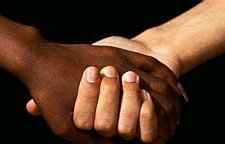
Clarence Page
http://www.jewishworldreview.com --
NEW racial and ethnic numbers in the 2000 census show an increasingly complex picture of the way we Americans look at ourselves. It also shows the job of counting by race and ethnicity to be about as precise as grabbing a handful of Jell-O.
The problem is race. It was an absurd way of categorizing people in the days of legal segregation, and it continues to be an imprecise way to count people as we try to repair the damage left by those days. For example, the census shows the Hispanic population has risen by 58 percent to 35.3 million. That revelation sparked numerous headlines about how Hispanics now equal or may have surpassed the slower-growing black population.
But a closer look raises questions about how much overlap there may be between the two groups, since one is a racial category while the other is an ethnic group.
Of the 13 percent of American residents who said they were Hispanic, for example, only about half (6 percent) called themselves "white." Almost all of the rest (5.3 percent) curiously checked "other." Many wrote "I am Hispanic" next to it, census officials said.
Does that mean those individuals thought they belonged to some other race than the listed choices of white, black, Native American Indian, Asian or Pacific Islander and "multiracial"? Or did it simply mean that none of the offered choices had any meaning to them?
"These categories of race just don't have a lot of meaning for Latino Americans," a spokeswoman for the National Council of La Raza, a Hispanic advocacy organization, said recently. Indeed, every country and culture seems to define race differently. The way Americans have defined it varies with time and, as the new census shows, by generation.
 |
| Not yet |
For the first time, Americans were offered the opportunity to check more than one race, and 2.4 percent of respondents did so. One in 12 African-Americans who were 18 or younger had more than one box checked, compared to only 2.3 percent of those who were 50 or older.
This undoubtedly reflects both a rise in interracial parenting and a relaxing of definitions in the way young people see themselves racially. That's good news, if it means that young people are seeing race not as a barrier to their aspirations but as a platform from which to move out and upward in a racially, ethnically and culturally diverse world.
But most African-Americans I know who have another race in their background tell me they did not bother to check any other box, simply because the effort would be misleading and meaningless.
For example, I have a Native American Indian grandmother on my mother's side. Yet, with all due respect to her memory, I have not checked the "American Indian" box on my census form. I respect Indians and their dynamic history in this country. I enjoy visiting with them in their communities. But I have no illusion about it being my community. DNA is not enough. I am not registered with any tribes, nor do I have a Native American "consciousness." As cousins go, I am about as distant as you can get.
And, it is worth noting, I do not look Indian. No matter what box I check on the census form, I know that anyone who looks at me would immediately say, "That's a black man."
So, while some people think there are too many questions about race and ethnicity on the new census form, I wonder whether there are enough.
For instance, besides the question about what you think you are, I could suggest an additional question: "What do others think you are?"
With that in mind I could dream up some modern-day questions on the form, like, "If you were driving down a highway by yourself, what would a police officer who was looking for a certain racial profile think you are?
Or, "If it was a rainy night in a big city and you tried to hail a taxi, what would the taxi driver think you are?"
Or, "If you were applying for a job, what race would the person doing the hiring think you are?"
Or, "If you were applying for a mortgage for a nice, new home, what race would the mortgage lender think you are?"
We are not likely to see such questions on real census forms. But questions like these illustrate how much race still matters in the everyday life of America. That's why, as complicated as it may be to keep track of racial demographics and measure our racial progress in a time of ever-changing standards, we still have to
Comment on JWR contributor Clarence Page's column by clicking here.
03/12/01: Jesse is a victim!
03/08/01: Saving kids from becoming killers
03/01/01: Parents owe "Puffy" and Eminem our thanks
